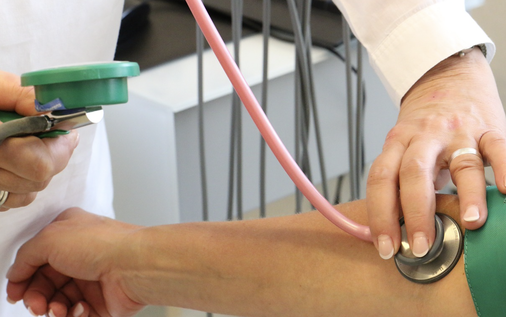|
If your heart is racing as you’re sitting reading this article, it’s possible your body is trying to tell you something. A high resting heart rate, or a heart rate of more than 100 beats per minute, means your heart is working extra hard to pump blood through your body. And, that extra effort could result in a wide range of negative effects on your overall health, including feelings of dizziness and fatigue – and most seriously – blood clots, heart failure and, in rare cases, sudden death.
Normal resting heart rate is anywhere between 60 and 100 beats per minute, and it’s simple to check how fast yours is beating. While idle, hold your pointer and middle finger between your bone and tendon on the thumb side on your wrist until you feel your pulse, and count the number of beats for a minute – that is your resting heart rate. Certain aspects of someone’s resting heart rate are directly connected to uncontrollable factors, such as age and genetics, however there are certain actions that be taken to help decrease heart rate and improve overall wellbeing for those whose resting heart rate is above normal. Here are six proven ways to lower your resting heart rate:
0 Comments
Your comment will be posted after it is approved.
Leave a Reply. |
The FDF LifestyleThis page includes blogs, healthy articles, inspiring pictures, exercise tutorials, music, etc. No content on this site, regardless of date, should ever be used as a substitute for direct medical advice from your doctor or other qualified clinician. Archives
April 2024
Visit this section daily to become more healthy and positive.Strengthen your mind by consistently learning new information.
New articles are uploaded throughout the week. |
Live |
Life |
To |
The |
Fullest |
Family Dreams Fitness LLC (www.familydreamsfitness.com) is not responsible or liable for any advice, course of treatment, diagnosis or any other information, services or products that you obtain through this site. You are encouraged to consult with your doctor with regard to this information contained on or through this website. After reading articles, watching videos or reading other content from this website, you are encouraged to review the information carefully with your professional healthcare provider.
You should understand that when participating in any exercise or exercise program, there is the possibility of physical injury. If you engage in any exercise or exercise program on this website, you agree that you do so at your own risk, are voluntarily participating in these activities, assume all risk of injury to yourself, and agree to release and discharge Family Dreams Fitness LLC from any and all claims or causes of action, known or unknown, arising out of Family Dreams Fitness LLC.


